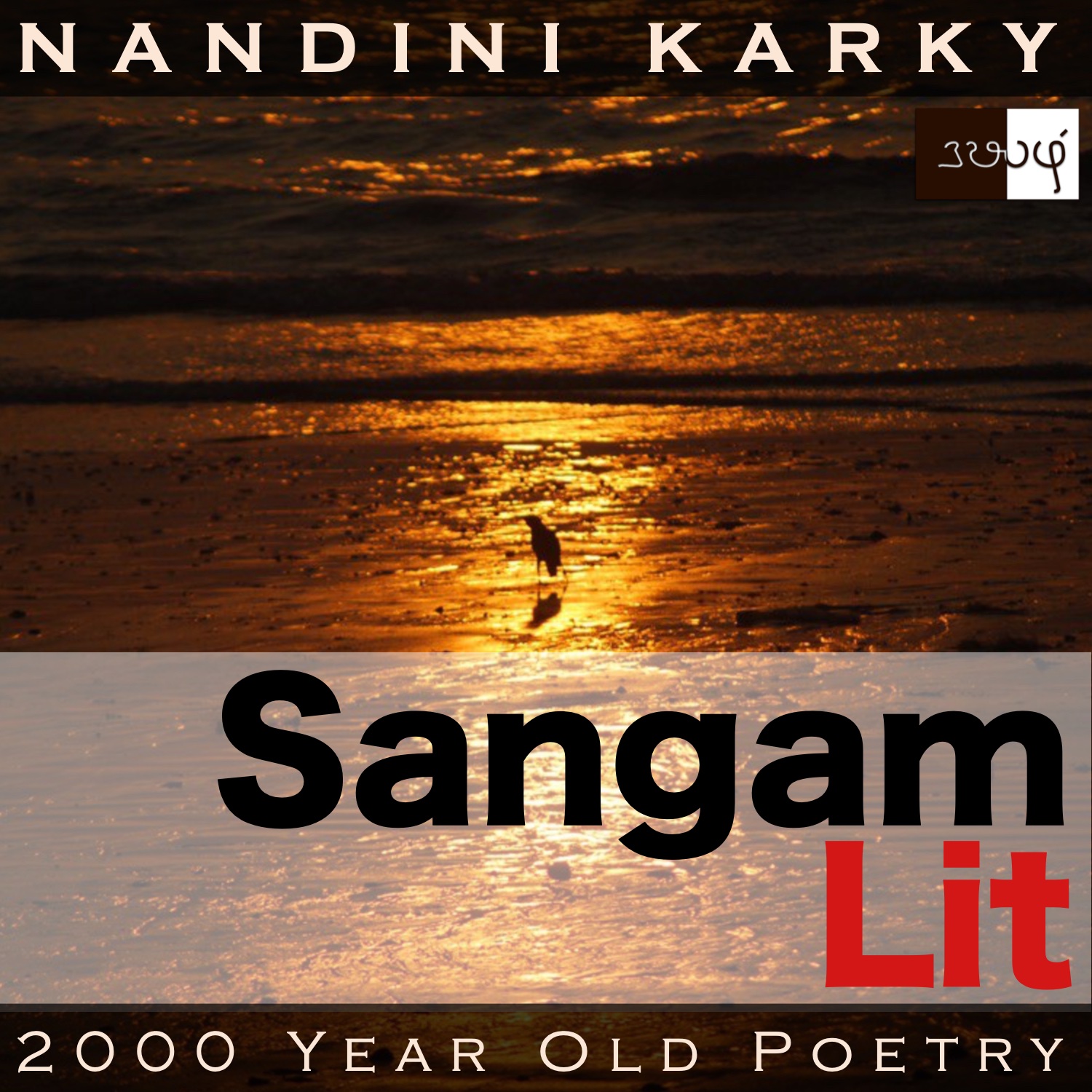Podcast: Play in new window | Download
Subscribe: Apple Podcasts | Spotify | Amazon Music | Android | iHeartRadio | Email | TuneIn | RSS | More

In this episode, we marvel at the intricate ingenuity depicted in Sangam Literary work, Natrinai 67, written by Peri Saathanaar. Set amidst the resounding waves of the ‘Neythal’ landscape or the coastal regions, the poem speaks in the voice of the lady’s confidante to the man, expressing a subtle wish to make him expedite his marriage with the lady.
சேய் விசும்பு இவர்ந்த செழுங் கதிர் மண்டிலம்
மால் வரை மறைய, துறை புலம்பின்றே;
இறவு அருந்தி எழுந்த கருங் கால் வெண் குருகு
வெண் கோட்டு அருஞ் சிறைத் தாஅய், கரைய
கருங் கோட்டுப் புன்னை இறைகொண்டனவே;
கணைக் கால் மா மலர் கரப்ப, மல்கு கழித்
துணைச் சுறா வழங்கலும் வழங்கும்; ஆயிடை,
எல் இமிழ் பனிக் கடல், மல்கு சுடர்க் கொளீஇ,
எமரும் வேட்டம் புக்கனர்; அதனால்,
தங்கின் எவனோதெய்ய-பொங்கு பிசிர்
முழவு இசைப் புணரி எழுதரும்
உடை கடற் படப்பை எம் உறைவின் ஊர்க்கே?
This is one of those poems that make those ‘word’ cells in one’s brain dance with glee! It begins with a bang with ‘சேய்’, the word now commonly associated with ‘infant’. However, here it’s used in the meaning of ‘distant’. ‘Distant’ and ‘infant’ – Two words that do not belong together in a happy world! Returning to the poem, another word I learnt today is ‘மண்டிலம்’ meaning ‘sun’. To more action, we meet with the verb ‘அருந்தி’ which is used now to mean ‘drink’. However, it seems to have other meanings like ‘to eat’, ‘to swallow’ and ‘to experience’. Here, the ‘கருங் கால் வெண் குருகு’ that we often meet in ‘Neythal’ poems, those ‘black egrets’ are the ones doing the eating/swallowing/ experiencing of a shrimp. Just like ‘சேய்’ we met at the beginning, the word ‘சிறை’ also filled me with fascination. For, it does not mean ‘prison’ as commonly used today, but ‘wing’. Ironic indeed that the place which clips one’s wings and curbs freedom is taking on the same word for ‘wing’!
Going from word shells to the whole of the shore, we find that the man is getting ready to leave after his tryst with the lady during the day. To the man, the lady’s confidante says, “As the sun decked with luxuriant rays, shining from distant skies, sets behind those mountains, the shore turns lonely! Those white-legged, black egrets rise after having their fill of shrimps and spread their wings to dry on those white salt mounds. Then, they fly to the ‘punnai’ tree on the shore and rest on its dark branches. As the tide rises and fills the marsh, submerging those fleshy-stalked, blue lotus plants, sharks roam with their mates close to the shore. On such a night, bearing many shining lamps, our kin have gone to fish in the cold sea. In this pleasant town, that’s drenched in sprays from the drum-like roaring sea, where waves rise and crash by the shore, why don’t you stay?” As it was not rightful for a man to stay the night at the lady’s house before their wedding, through these words, the lady’s confidante is actually urging the man to seek the lady’s hand in marriage and stay in the long run.
From the shells and the shore, if we turn our attention to the vast sea that spreads before our eyes, we can gather rare pearls that lie hidden therein. Let’s start with that love story between the sun and the shore. As the sun leaves to set behind the mountains, the shore is lonely and maybe even laments, says the confidante. This is an apt metaphor for the state of the lady as the man, her sun, leaves her when twilight arrives. By pointing to birds that rove the seas all day, turning to their nests on the branches of the ‘punnai’ or the laurel wood tree, the confidante paints a picture of the comforts of home, filled with marital bliss. Bringing forth images of submerged blue lotuses and roving sharks, she points out the dangers in the man’s path as he prepares to leave. Again, highlighting that the man should formally unite with the lady, she talks about the shark swimming with its mate. A luminous image of men in boats with lamps shining in their hands, intent on fishing those rich waters, flashes before our eyes. Then, comes a picturesque portrait of the lady’s pretty, little hamlet by the sea. A place so pleasant to live in, where waves crash like drums on the shore and spray playfully all around.
With such an invitation, anyone would want to stay! But the man cannot and will not, for it was not a custom of honour to stay at the lady’s place before their formal union. Instigated by the confidante’s words, he’s sure to leave now but rush back to win her hand in marriage. The lady’s confidante could have boxed the ears of the man and asked him to quit visiting like this and get the marriage going. But, she chooses not to go the harsh way. Through her gentle approach, she presents herself as a welcoming, positive soul and subtly sows the seed for a good turn in the lady’s life soon. A wise skill we can all learn from the confidante to bring about the right things in this world, the light and bright way!




The modern version of this song
டாடி மம்மி வீட்டில் இல்லை
தடை போட யாருமில்லை
விளையாடுவோமா உள்ளே வில்லாளா!